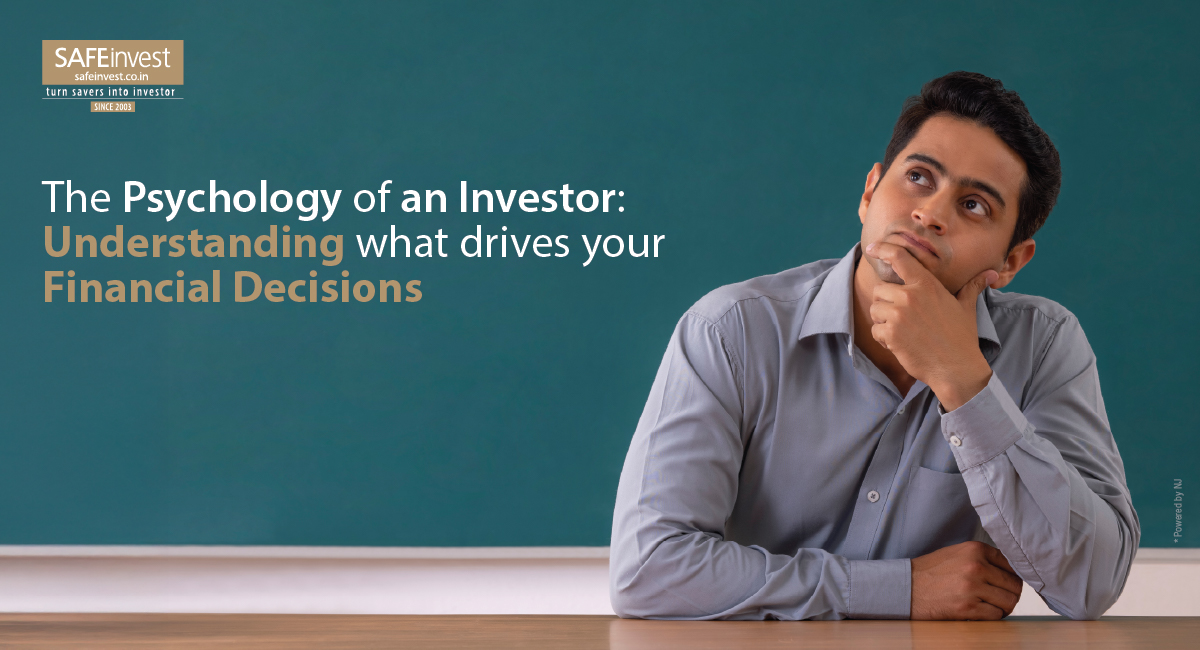The Psychology of an Investor: Understanding What Drives Your Financial Decisions

Money matters are never just about math. If it were all about numbers, we’d all be perfect investors, right? But as anyone who’s ever felt anxious during a market dip or overly excited in a bull run knows Investing Psychology plays a massive role in how we manage our wealth.
In fact, What Is Investor Psychology? It’s the study of how emotions and cognitive biases influence investor behavior. It helps explain why people make irrational decisions with their money even when they know better.
Let’s dive into the Psychology of Investing, and explore how understanding your own mindset can make you a more confident and composed investor.
Why Emotions Trump Logic in Investing
We like to think we’re rational creatures when it comes to money, but the truth is we’re anything but. Our brains are hardwired with certain emotional reflexes like fear, greed, regret, and overconfidence, that can easily overpower logic.
- Fear can make you sell at a loss during a downturn.
- Greed pushes you to chase hot stocks or trends.
- Regret leads you to dwell on past mistakes, missing new opportunities.
- Overconfidence makes you underestimate risk and overestimate your knowledge.
Each of these emotional states can skew your decision-making and lead you away from building long-term wealth.
The Biases That Trip Up Even the Smartest Investors
Even experienced investors fall prey to cognitive biases. Let’s look at a few common ones:
- Herd Mentality: You buy or sell because everyone else is doing it.
- Confirmation Bias: You seek out information that agrees with what you already believe.
- Loss Aversion: The pain of losing money is psychologically stronger than the pleasure of gaining it.
- Anchoring: You rely too heavily on the first piece of information you get, like the purchase price of a stock.
These mental shortcuts can be useful in daily life, but in the investing world, they often lead to poor judgment.
Building Emotional Intelligence as an Investor
Here’s the good news: understanding the Psychology of Investing isn’t just about spotting flaws, it’s about building strengths.
Being aware of your mental patterns gives you a chance to pause, reflect, and choose better responses. For example:
- Create a written investment plan so you don’t panic during market volatility.
- Review your decisions regularly to identify patterns or habits.
- Practice patience, it’s one of the most underrated investing strategies.
- Diversify wisely to reduce the emotional impact of a single investment going south.
By managing your emotions, you’re not trying to eliminate them, you’re learning to work with them, not against them.
The Role of a Relationship Manager in Navigating Emotions
One often overlooked asset in managing your investing mindset is a trusted relationship manager. They bring in a level-headed, external perspective that helps cut through emotional clutter.
A good relationship manager doesn’t just offer financial products—they offer clarity. When emotions run high, they help you:
- Stick to your long-term needs instead of reacting to market noise.
- Rebalance your portfolio when needed, without panic.
- Bring discipline to your investing strategy with regular reviews and adjustments.
Think of them as a coach who keeps you focused, even when your emotions try to take the wheel.
Long-Term Thinking vs. Short-Term Reactions
One of the biggest lessons in Investing Psychology is learning to zoom out. In the short term, markets will always be volatile. But if you train yourself to focus on long-term trends and needs, you’ll be less likely to make reactive, emotionally-charged decisions.
Successful investing isn’t about being emotionless. It’s about being self-aware and intentional.
Final Thoughts: The Mindset Matters
Understanding What Is Investor Psychology? can be a turning point in your financial journey. While financial literacy is essential, emotional discipline is what keeps your strategy intact when the going gets tough.
In the end, the best investors are not those who never make mistakes but those who learn to recognize their own behavioral patterns and improve upon them.
So before your next investment decision, take a moment to check in with your emotions or better yet, talk it through with a trusted relationship manager. Because when it comes to your portfolio, your mind is your most powerful asset
